- Register
- Log in to Tune-In
- Wishlist (0)
-
Shopping cart
(0)
You have no items in your shopping cart.
Beatles News
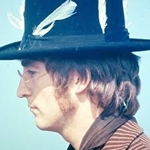
John Lennon was profoundly shaped by one person whose influence and sudden loss would alter the course of his life.
John Lennon was at the start of his music journey when a devastating tragedy struck, leaving a lasting impact on the young man he was and the music legend he would become. The future Beatles founder was profoundly shaped by one person whose influence and sudden loss would alter the course of his life and help define his path to global superstardom.
On this day, July 15, 1958, John's mother, JuliaLennon, was struck and killed by an off-duty police officer named Eric Clague. Lennon was just 17 at the time of the tragedy, and his mother was 44.
John was born on Oct. 9, 1940, to Julia and Alfred Lennon. He was their only child together.
When he was four, the future musician was taken in by his aunt, Mimi Smith, and uncle, George Smith, to provide the young boy with a stable home life. John would live with the couple throughout his childhood and adolescence.
Although John resided with Mimi, he maintained a strong and affectionate bond with his mother, Julia. She nurtured his early love of music, buying him his first guitar and teaching him basic chords on the banjo and ukulele. details
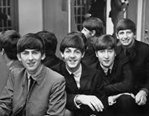
If you grew up as a teenager or young adult in the 1960s, you had the privilege of experiencing a band that changed the course of popular music more than any other. It was, of course, The Beatles.
In this article, we're ranking The Beatles' songs based on how they redefined music through experimentation and innovation, and how each song broke new ground technically, artistically, or culturally, including "Strawberry Fields Forever" and many other revolutionary hits.
Understanding Musical Innovation in The Beatles' Era
In the early 1960s, studios primarily served as venues to capture live performances on film. The Beatles, however, took a completely different approach from other artists. With their first album, Please Please Me (1963), they set out to replicate their energetic live nightclub performance and went on to record the full release in under 12 hours.
They were at a turning point when recording studios became creative laboratories, where, thanks to multitrack recording technology, musicians could now add, remove, and manipulate musical elements. The Beatles, alongside producer George Martin and engineers such as Geoff Emerick, took full advantage of this and transformed Abbey Road Studios in details

As astronomically successful and unique as John Lennon’s short life was, tragedy and hardship punctuated his 40 short years, from the death of his mother on July 15, 1958, to his own fateful end in December 1980. The latter event would impact the entire world, not to mention his former bandmates. But the former tragedy was equally influential, deeply affecting Lennon, his band, and the music they created.
Without Julia Lennon, John might not have grown into a musician. Perhaps he would have settled for a blue-collar job or the bohemian life of a visual artist. Fortunately for John (and the rest of the world), Julia happily passed down her love of music to her son.
Considering her son’s global cultural influence, it should come as no surprise that Julia Lennon (née Stanley) was as every bit as charismatic, daring, and rebellious as her son, John Lennon, would come to be. If there were ever a problem child in the Stanley family, they would likely give Julia the title. She danced, sang, joked, and played instruments without any care for lady-likeness or societal (and familial) expectations that might be looming over her.
Julia married Alf Lennon in 1938, much to the chagrin of her f details
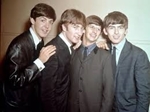
The iconic boy group, with John Lennon, Paul McCartney, Ringo Starr, and George Harrison, stole the hearts of many with their loving voices and looks. George temporarily left The Beatles in January 1969 due to creative differences and the band's internal dynamics. He rejoined the group days later and helped create a fan favorite song from their most iconic album, Abbey Road.
While George studied Indian music when working with Ravi Shanker, which he incorporates into the mix, along with other sounds, in the middle of the song, the Beatles member made one tiny error.
George was stuck when it came to the final verse and did not know if it should have been “it seems like years” or “it feels like years”. He went a different route and sang a mixture, combining the two, "it seels like years”. The singer was known for his powerful lyrics.
Their lyrics have also made headlines for being controversial.
We use your sign-up to provide content in ways you've consented to and improve our understanding of you. This may include adverts from us and third parties based on our knowledge of you. More info
The band's song I Am the Walrus released in November 1967, written by John details

When The Traveling Wilburys first appeared on the scene, they spread joyous vibes across the music world. Here were five legends putting aside any ego, to the point that they even used fake names, to deliver effortlessly rootsy music that charmed and enthralled listeners.
But when they returned for their second album a few years later, a bit of gloominess hung around the edges. One of the Wilburys had passed away in the interim, leaving a gaping hole that the four remaining members knew they couldn’t even try to fill.
The Wilburys Rise
The common story about the creation of the Traveling Wilburys is that it was a spontaneous thing. But that’s not quite the case. As he was making his 1987 album Cloud Nine, George Harrison expressed to Jeff Lynne that he wanted to one day put together a band featuring all his favorite artists. He mentioned Roy Orbison and Bob Dylan as ideal members.
That dream became a reality when Harrison, needing to make a B-side for a single, assembled Lynne, Dylan, Orbison, and Tom Petty. Harrison’s record company reverberated with excitement when they heard the finished product, “Handle With Care”. They asked if the collaboration could be more than details

The Beatles have a complicated history. Their time together was plagued by turmoil, which dampened their legacy. However, there are tender moments in the band’s collective history that remind us that they were once kids who forged a friendship with music as the groundwork. One such moment is Paul McCartney‘s “Little Willow.”
Several decades after the Beatles broke up, McCartney decided to pen a song in honor of Ringo Starr’s late wife, Maureen Starkey. Attempting to comfort her children, “Little Willow” is a sonic explanation of life’s unpreparable changes. Wind’s going to blow you hard and cold tonight / Life, as it happens / Nobody warns you, willow, hold on tight, the lyrics read.
Though the band had been broken up (and ended on a sour note), McCartney thought a lot of Starkey and didn’t think twice about honoring her in this way.
“I wanted to somehow convey how much I thought of her,” McCartney once said. “For her and her kids…It certainly is heartfelt, and I hope it will help a bit.”
Even though Starkey inspired this song, McCartney did what he does best and “conjured” up a larger-tha details
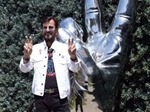
Starr, who celebrated his 85th birthday on Monday, July 7, was in a reflective mood as he looked back on his 37 years of sobriety.
The former Beatle was speaking to reporters at his annual “Peace & Love” birthday celebration in Beverly Hills when he made the announcement and shared how his life changed after giving up alcohol.
Surrounded by his musician friends, including Jackson Browne, John Desmond of The Doors and Colin Hay (Men At Work), Starr shared his sobriety journey.
“Well, I ended up in a rehab because I was not treating myself or anyone around me with any respect,” he said, as reported in People magazine.
“It was all about me, and I came out, and I haven’t had a drink since. Thank the Lord.”
In 1986 both he and his second wife, former Bond girl and actress Barbara Bach, entered treatment together to deal with their substance and alcohol addictions.
Starr has previously discussed his difficulties with addiction before, and in 2015 told the Times of London, he could not remember much of the 1970s or 1980s.
“I look in the mirror and I’m 24. I never got older than 24.”
The Liverpool-born drummer details

Yoko Ono was not a factor in the break-up of The Beatles despite being blamed for decades, a historian claims. Martin Lewis points to Apple TV’s recent Get Back series as evidence her presence in the Beatles studio did not cause the tension between John Lennon and his bandmates many insist was behind the demise.
Yoko being at the 1969 Let it Be album recordings has gone down in music folklore as the beginning of the end for the Fab Four. But Martin, who has worked with both her and Paul McCartney in recent years, said: “The fans wanted a villain. The media likes a villain. We all do. That’s natural, but not reality.”
Speaking about the Apple TV series, he added: “They are in the studio. Yoko’s there, which was unusual. They didn’t normally have wives or girlfriends in the studio. Who does John relate to through the whole eight hours? He looks at Yoko once in a blue moon. His eyes are on Paul. He’s with his buddy of the last 13 years. It’s all about John and Paul.
“Yoko was there, she wants to be there. He’s not rude. He’s just not interested. He’s working with his mate and having fun. The whole film gives details
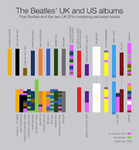
I never really was familiar with the original Beatles US album releases. I just knew they were different. I had seen some of the covers and just assumed they were some weird compilation albums.
I started getting into music as a teen from junior high through college 1979-1989 and my first Beatles pruchases were the so called red and blue compilation albums. A great introduction that covered the big hits across their entire history. Later I got 1 and Past Masters and Anthology even later. But I never bothered with the original albums much.
Then I got streaming and just assumed the albums as presented on apple music was what everyone knew. It was only later that I found out that those were the UK versions of those albums (with the exception of Magical Mystery Tour). But anyway I learned what their catalogue was from those albums.
So this is kind of a shock to me to see graphically how those albums were compiled and I did a deep dive into some of why.
I'l follow up with more but basically:
- the Beatles first couple of singles flopped in the US and EMI licensed away the Beatles rights to the songs on their first UK record to Vee-Jay records which was struggling financially, faced bankruptcy and
details

The Beatles' vast back catalogue of songs came together in many different ways. The vast majority were written by Paul McCartney and John Lennon and in the early days they would sit together at Paul's childhood home on Forthlin Road in Allerton and write in tandem.
However, as artistic differences within the band emerged in the later years, John and Paul would increasingly do their own thing - writing alone before bringing a piece of work to the other for tweaks and changes. Every song the two wrote for the band had a joint writing composition credit - even through sometimes they were completely independent efforts.
And in some cases, the two would write their own full sections and combine them into one song. This was the case with 'A Day in the Life', which featured on the seminal 1967 album 'Sgt Pepper's Lonely Hearts Club Band'.
John wrote the first half of the track in January 1967, inspired by a number of articles he had read in newspapers. He then played Paul the song and Paul then added the middle-eight section, which drew on his Liverpool upbringing.
Lyrically, John drew on the news of the death of the Guinness brewery heir Tara Brown and a Daily Mail report about potholes in details
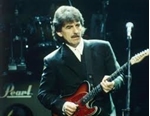
A book of Beatles -era photographs taken by George Harrison, many of them never published, will be released next year.
Random House announced Thursday that ''The Third Eye,'' which includes more than 250 black and white and color images, is scheduled for Fall 2026. Harrison's widow, Olivia Harrison, compiled and curated the book, which covers the years 1963-69 and includes photos of the Beatles everywhere from their native Liverpool to India to Shea Stadium.
''I want to show people, from George's unique photographic perspective during the Beatles' early years, the moments when the whole of your life is ahead of you with unknowable possibilities," Olivia Harrison said of her late husband, who died in 2001, in a statement released by Random House.
"His images in ‘The Third Eye' capture that spirit.''
The Harrison book features essays by Olivia Harrison and by two celebrated literary authors: Irish novelist Colm Tóibín (a former chancellor of the University of Liverpool) wrote the introduction, and American short story writer George Saunders contributed an epilogue. ''The Third Eye'' also includes George Harrison's words alongside his pictures.
Fellow Beatles Paul McCartn details

While giving an interview to Playboy in 1980, John Lennon shut down criticisms that Yoko Ono was “controlling” him. It had been a long-standing rumor from critics who felt that Ono’s influence had broken up The Beatles, and Lennon and Ono were often frustrated with the negativity and insult.
Lennon began by sharing his disdain for how they were portrayed in the media. They had stopped giving interviews for a period of time, but he found that they were still constantly reported on.
“The gossip items never stopped,” he said. “We never stopped being in the press, but there seemed to be more written about us when we weren’t talking to the press than when we were.”
Some of that publicity centered on Ono’s influence over Lennon. However, the two rejected the gossip, finding it insulting, hurtful, and just plain ridiculous. When asked about the negative press, John Lennon shared some vulnerable truths.
“We are both sensitive people and we were hurt a lot by it,” he admitted. “I mean, we couldn’t understand it. When you’re in love, when somebody says something like, ‘How can you be with that woman?’ you say, & details

Stranger Things actor Joseph Quinn has opened up about getting to play rock legend George Harrison in director Sam Mendes’ upcoming films about The Beatles.
According to The Standard, Quinn spoke to the PA news agency on the red carpet for the U.K. premiere of his film The Fantastic Four: First Steps. He said being in the Beatles film is something he never could have dreamed of.
“It feels exciting, it feels a little daunting,” Quinn shared. “I’m definitely inspired by the three men that I’m working with, and Sam, who’s directing it.”
Quinn’s co-stars include Harris Dickinson as John Lennon, Paul Mescal as Paul McCartney and Barry Keoghan as Ringo Starr.
“We’ve been doing a few weeks of rehearsals that I’ve really been enjoying,” he added. “It’s beyond my wildest dreams. I can’t believe I’m able to participate in a film and a project like this.”
Mendes’ Beatles films, titled The Beatles – A Four-Film Cinematic Event, will be released in April 2028. Each film will be told from a different band member’s point of view.
The Sony films will mark the first time Ap details

Some of the best stories, both fiction and non-fiction, often end abruptly on a cliffhanger and or in a big ball of fire. Endings such as these aren’t necessarily cathartic, as they are not fully fleshed out. However, what they are is mystical and mythical, as they incite the question of “What if?” This is the exact type of story The Beatles‘ breakup equates to, as their legendary legacy only grew with their razor-sharp split. They didn’t trickle into old age and maybe a mediocre career. No, they soared off into the sunset like a phoenix, and the myth surrounding them benefited from it, and John Lennon agrees.
Many of the finest bands have shot themself in the foot by holding on for too long. In reality, they should have called it quits in their prime, as their legacy has been tarnished by beating a dead horse for too long. The Beatles, seemingly not on purpose, did not do this in the slightest. Did they have a lot more years left in them upon their breakup? Certainly, however, what would they have become? Quite possibly an animatronic four-piece band regurgitating their biggest hits, as we’ve seen so many classic bands become. That being so, we Beatles fans should be grateful for the details

Between November 1966 and March 1967 the Beatles recorded Sergeant Pepper’s Lonely Hearts Club Band at the Abbey Road studios. This album, which sold one and a half million copies in its first two weeks of release in the United States, became an electronic bible for the emerging drug generation, then the editor of International Times, London’s first underground newspaper, and currently the editor of London’s Time Out magazine, went to the recording sessions at the invitation of Paul McCartney. In the following behind-the-scenes account he tells you what it was like to be there.
I remember it well. “The Return of the Son of Monster Magnet,” the last track on the Mothers of Invention’s Freak Out album, came to an end and Paul McCartney strolled across his huge living room to take the record off. In one corner a BBC color-TV monitor was mistimed to give a flickering abstract pattern; two René Magritte paintings glowed on the wall in the pale afternoon winter sun; and Martha, Paul’s Old English sheepdog, lay content in front of a crackling log fire. I sat by the French windows enjoying a cup of tea. Paul returned and picked up the conversation where we’d left off. &ldqu details
